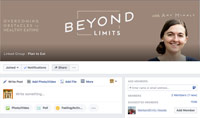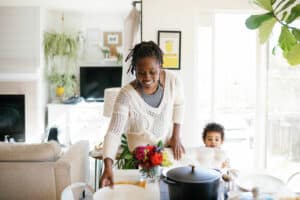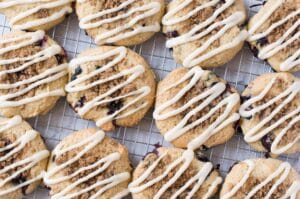Welcome to part 2 of our 7 part series exploring how to approach “healthy eating.” In case you missed it:
Part 1: Getting Started
Part 2: Eating Healthy When You Never Learned How to Cook
Part 3: Eating Healthy When Limited by Time
Part 4: Eating Healthy When Limited by Money
Part 5: Eating Healthy When Limited by Allergies
Part 6: Eating Healthy When Limited by Picky Eaters
Part 7: Eating Healthy When There Are Multiple Limits to Overcome
Today we are going to discuss the limitation of knowledge. What if you never learned to cook? All the cooking tips in the world won’t help you if you never learned how to cook in the first place. How can you overcome that?
If you never learned to cook, you are in good company. Fast food, TV dinners, and cancelation of home economics classes have taken away the tradition of cooking from many homes. While there are many reasons and motivations for this trend, let’s suffice it to say: many people never learned how to cook.
But don’t despair!
If you think you are alone in this, think again! Over half the people I teach a meat stock recipe to have no idea how to cut up a chicken, what scum is, or what a simmer means. But all of these are just techniques. Every chef that has ever published a cookbook or made it on TV started with the same techniques.
Cooking is a skill that can be learned.
So, if the idea of cooking all, or even most of your meals at home is overwhelming to you, have hope! You can learn, and you can succeed. And (who knows?) maybe you will even enjoy it.
Ready to get started? Try one of these ways to learn the techniques of cooking:
Take a cooking class
There are cooking classes held locally in almost every city. Many of these are designed with the no-background-in-home-economics adults in mind. They are a hands-on way to learn the basic techniques in an environment where you can ask questions and get clarifications.
Watch online videos or cooking shows
If you can’t find a physical class that works for you, or if you prefer a different learning format, then try watching shows or online videos. When you find someone you like, make sure to follow them! They will provide inspiration as well as instruction.
Find a mentor
If you know anyone who loves to cook (or is at least good at it) ask if they are willing to be your mentor. Maybe they would be willing to have you over to cook with them once a week, or be on call to answer your my-pot’s-overflowing-what-should-I-do questions. Don’t forget about people in the generations older than you. They likely took home economics and perhaps grew up watching their mother or grandmother cook. They also may have a little more time to spend with you. Try to find someone who would love to pass on what they learned from their grandparents. You might learn about the richness of food preparation, and not just the techniques.
Start cooking! (And don’t be afraid to mess up)
Maybe you feel like you know enough to get started, or you are a hands-on, let’s do this kind of person. Perfect! Get a cookbook, look up a recipe, and get started! Try it, and don’t be afraid of failure. There is a good chance your recipe will be edible, even if it isn’t delicious.
The Nourishing Traditions Cookbook for Children is a great place to start if you have no cooking background. It contains real recipes, but starts with ones that are simple and basic. The amazing thing about this book is that it gives more than the ingredients. It teaches and explains things like how to measure, what certain terms signify, and the order of adding the ingredients.
Whichever way you choose, when you make your recipes, keep in mind these simple rules.
- It’s only a failure if you give up! Everything else is an experiment
- Don’t expect too much of yourself as a beginner. Start with simple recipes.
- Eat (or don’t) what you make. Study the outcome and learn from it.
- Keep cooking!

We reached out to Amy to put together this series of blog posts that we are calling Beyond Limits to provide a little encouragement, and a lot of wisdom, for those of us going through a massive transition with food.
If you are struggling with food allergies, eating more healthfully, or a new way of eating that has been “forced” upon you, please join us:
Join us in Plan to Eat
Amy has put together 15 recipes that are available to you through your Plan to Eat account. Many of these recipes promote healing, some are designed to help avoid common allergens, and some of them are simply to get us in the kitchen cooking real food instead of pulling something out of a box.
All of these recipes are available through the desktop version of your Plan to Eat account by clicking on the Challenges tab and selecting “Beyond Limits” in the dropdown menu.
Join our Facebook group
Do you have a question for Amy? Or maybe you want to connect with others who are going through something similar to you? Our Beyond Limits Facebook Group is a great place to connect with others!
Hint: This is a great place to use the Friends feature to share recipes with other Plan to Eat users!
Join the Beyond Limits Facebook group!
Up Next: Eating Healthy When Limited on Time





